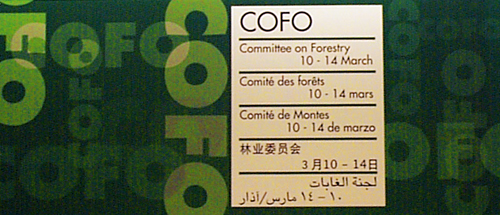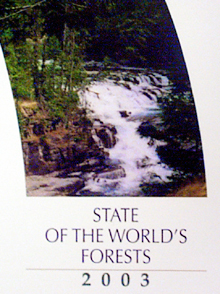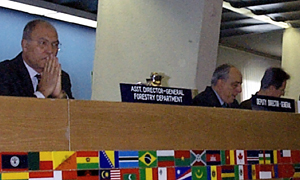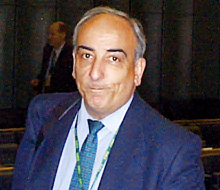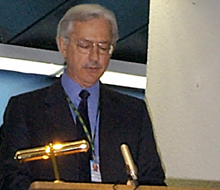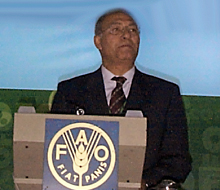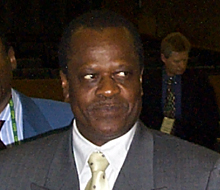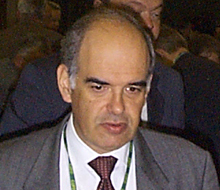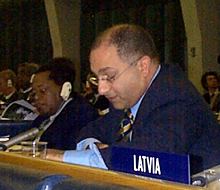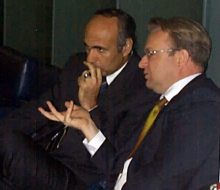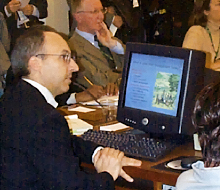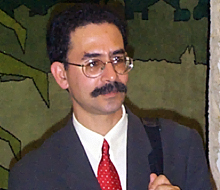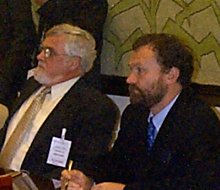|
State of the World's Forests 2003: Assistant Director-General of the FAO Forestry Department Hosny El-Lakany presented highlights from the State of the World's Forests Report (SOFO 2003). He informed delegates that the publication contained contributions from International Governmental Organizations (IGOs), Non-Governmental Organizations (NGOs) and individuals in their personal capacities. With regard to agricultural expansion and deforestation he said that agricultural land is expanding in 70% of countries worldwide and declining in 25%. In two-thirds of the countries where agriculture is expanding, forest area is decreasing. In 60% of the countries where agriculture is decreasing, forest areas are increasing. El-Lakany also highlighted challenges facing developing countries with low forest cover and SOFO 2003's identification of causes and effects of forest degradation, commonalities and potential ways forward, including integrated and holistic approaches, alternative incomes for rural people, communication and information sharing, and the use of treated wastewater. On decentralization, he mentioned that over 80% of developing countries and countries with economies in transition were experimenting with decentralization. SOFO 2003 reviews recent means of effective cooperation between governments, private industries and NGOs to curb illegal logging and corruption.
The recent Forestry Outlook Study for Africa (FOSA), which is based on 32 country reports from Africa, indicates that public expenditure often less than 1%. Investments lag behind inflation, with most domestic expenditure directed to staff costs. Finally, SOFO 2003 highlights the importance of international forestry dialogue and the role of the National Forest Programme Facility regarding capacity-building and knowledge management, and forest-related decisions emerging from the World Summit on Sustainable Development (WSSD).
 Listen to Hosny El-Lakany Listen to Hosny El-Lakany
The Chairman invited comments from delegates. Senegal said there was a lack of adequate access to information. The European Union, Brazil, Malaysia and Kenya requested that in future the SOFO Report be distributed prior to COFO. Brazil and Malaysia raised concerns regarding the Report's definition of illegal logging. Brazil shared progress on its national development for SFM, including the launch in 2000 of its national forest program, involving he said, wide stakeholder participation. Sharing thoughts on its long-term ecological challenges, the US commended the report's focus on, inter alia: Criteria and Indicators (C&I) for SFM; collaborative and regional processes; importance of fresh water; and inclusion of the social sciences, such as participation and governance in SFM. He stressed the importance of global collaborative partnerships, such as the Congo Basin Initiative. Guatemala said that it had experienced a lack of international support for the inclusion of forestry in development programs and stressed the need for inter-sectoral links. Lebanon noted its commitment to SFM and highlighted the importance of FAO's expertise on pest control. The Republic of the Congo said the FAO should play a leading role in all aspects of SFM including C&I and forest certification. Iran said specific challenges facing the low forest cover countries (LFCCs), such as subsistence dependency on forests, were not considered in the Report. Rwanda emphasized the need to identify alternative energy sources and the importance of forests in generating livelihood and battling poverty, and provided data on its reforestation activities in the last decade. Egypt underlined the importance of water and use of treated wastewater as social and economic factors in forest management, and called for COFO's attention to recommendations for the Mediterranean region. Kenya welcomed the compilation of material in FOSA; called for follow-up action; and emphasized concerns over illegal forest activities domestically and internationally.
 Listen to the Senegal Listen to the Senegal
 Listen to Brazil Listen to Brazil
 Listen to Malaysia Listen to Malaysia
 Listen to the US Listen to the US
 Listen to Guatemala Listen to Guatemala
Assistant Director-General El Lakany expressed regret at the inevitable delay in the production of SOFO as an up-to-date document. He noted the difficulty in verifying conflicting figures within one country and invited authenticated corrections. In response to Brazil and Malaysia he said that SOFO raised issues of international significance. He expressed gratitude for support of the national forest program. He said that FAO would try to report periodically on national experiences regarding water.
 Listen to El Lakany Listen to El Lakany
|

